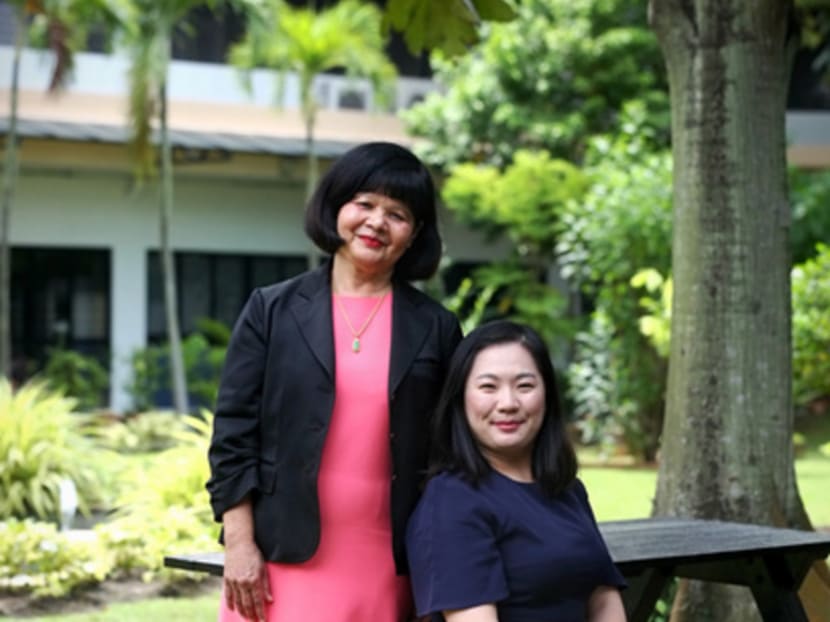IMH case managers serve as counsellor, friend and advocate to mentally ill patients
SINGAPORE — When David (not his real name) was re-admitted to the Institute of Mental Health (IMH) five times in 2014 — more than a decade after he was first diagnosed with bipolar disorder — his condition set off alarm bells for case manager Christine Tan.

Ms Margaret Hendriks (left), head of IMH’s case management unit, and Ms Christine Tan, a case manager in her team. The 53-man unit offers wide-ranging help to patients from the point of admission to the institute, such as reminding them to take their medication, supporting those wrestling with relationship issues or stress, and counselling their caregivers. Photo: Nuria Ling
SINGAPORE — When David (not his real name) was re-admitted to the Institute of Mental Health (IMH) five times in 2014 — more than a decade after he was first diagnosed with bipolar disorder — his condition set off alarm bells for case manager Christine Tan.
It was only when she visited David at home that Ms Tan discovered that the elderly man had not been sticking to his medication routine due to a housemate’s interference.
“We found out there was a complaint lodged against him (David) by some members of the community, and he was not getting on well with his flatmate at all,” said Ms Tan, who is part of a 53-man case management unit at IMH that offers wide-ranging help to patients from the point they are admitted to the institute.
Ms Tan then sat down with David, who is in his 60s, and helped him to improve his living conditions, such as getting him a new mattress and teaching him how to dress properly, and reminded him to tone down his actions. The changes helped David to conduct himself better when interacting with the people around him.
“In the past, people just regarded him as someone unwell ... He gets very high and will dance in the corridor, speak to people irreverently ... But after making these little changes, he now has meaningful friendships with his neighbours,” Ms Tan said.
David, who has learnt to take his medication regularly, now takes time to visit his elderly sister often. He is one of about 120 patients Ms Tan attends to as an IMH case manager.
During the Committee of Supply debate last month, the Health Ministry announced plans to ramp up case management support so that more patients are better supported after they are discharged from the IMH, to ensure that they adjust well back home.
The IMH expects to match another 3,000 patients to case managers over the next five years, on top of the current 8,000.
Ms Tan and her colleagues in the IMH case management unit offer wide-ranging help to patients from the point of admission, such as reminding them to take medication, supporting those wrestling with relationship issues or stress, and counselling their caregivers.
“Sometimes, we are the pharmacist, sometimes we are the nurse, their friend, their advocate, their counsellor ... We try to be everything they need us to be at that point in time,” said Ms Margaret Hendriks, who heads the unit.
Case managers, who each take up to 120 patients at any one time, also work closely with patients post-discharge. Within 48 hours after discharge, the case manager will phone the patient to check on his or her daily routine.
Patients who have more severe conditions, such as schizophrenia and delusional disorders, will be “hand held” for up to a year by case managers, who will visit them regularly and continue to provide social, emotional and medical assistance.
The hand-holding journey is often an emotional one for the case workers too, who often get vulgarities hurled at them, or have to help caregivers overcome difficulties in accepting the patient’s condition.
“Apart from empathy and compassion, being a case manager calls for this ‘never-give-up’ spirit, that there is always something that can be done,” said Ms Hendricks.
This system of support, which started as a four-man team in 2003, has helped improve patients’ attendance rate for follow-up appointments at specialist outpatient clinics upon discharge, said the IMH.
The rate for such first appointments rose from 79 per cent in 2009 to 96 per cent last year.
Patients with schizophrenia and delusional disorders were also able to stay well in the community longer, said an IMH spokesperson, with annual readmission rates falling to 40 per cent in 2014, from 43 per cent in 2009.
To involve the community in caring for persons with mental health conditions, IMH case managers have also been working with grassroots organisations and family service centres (FSC) to support patients post-discharge.
For instance, the case managers meet weekly with social workers at Ang Mo Kio FSC to visit patients and offer guidance on how to follow up with each of them.
“If anything critical breaks in those areas they (social workers) serve, they will call us. So the community partners are also happy they have someone to consult,” said Ms Hendricks.
As more members of the public are trained to spot and counsel those who show symptoms of mental disorders — serving as “case managers” within their communities — they can also be the go-to points for neighbours who wish to flag such cases.
“Sometimes we don’t want to be labelled as busybodies or scolded for interfering with other people’s affairs. So a well-trained helping group will be valuable ... The community are the eyes and ears on the ground after all,” said Ms Hendricks.
24-hour Mental Health Helpline 6389-2222 (manned by trained helpline counsellors)






